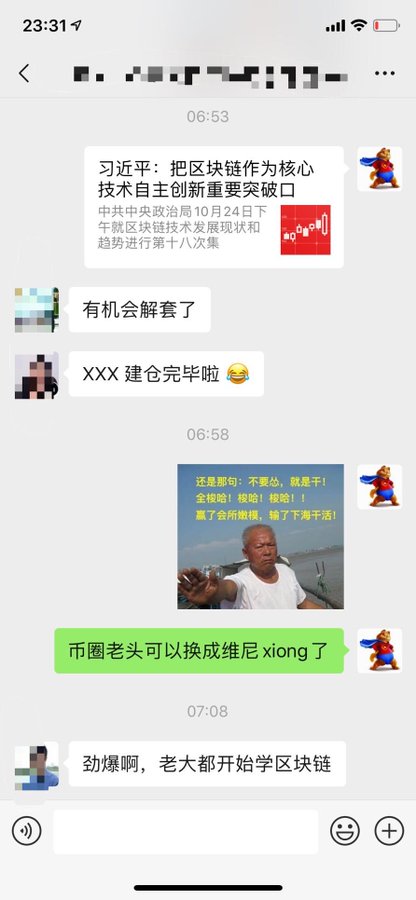On October 26th, a Twitter user reported that his WeChat account was suspended for “spreading malicious rumors” after he posted a comment about Winnie the Pooh subsequent to sharing an article on President Xi Jinping. The conversation took place in a group chat in which the user and several other individuals were discussing blockchain and a major decision by Xi to embrace the technology. In a speech given to the Political Bureau of the Central Committee on October 24th, Xi said blockchain must be treated as one of the nation’s core technologies and called for more research, support and investment.
Chinese authorities have banned all comparisons between President Xi and Winnie the Pooh since 2017. The Pooh reference was first made after memes showing the resemblance between Xi and Pooh began circulating in 2013.
@frankyuyang: WeChat account gone after one mention of Winnie the Pooh
The following is a screenshot of the conversation and a translation of the text:
User A: Xi Jinping: Make blockchain an important breakthrough for independent innovation of core technology.
User B: Here is a chance to break free.
User C: The building process for XXX has been completed.
User A: Still that same sentence: Don’t be scared, just do it!
What are you shuttling for!
If we win we go clubbing. If we lose, we take the plunge and get down to business!
User A: The coin man can now be replace by Winnie the Pooh.
User D: This is blowing up, even the boss is starting to learn blockchain.
This WeChat account has been permanently prohibited from logging in due to allegedly spreading malicious rumors and other illegal content. Tap “confirm” to learn more. [Chinese]
Blockchain, which was originally used for cryptocurrencies such as bitcoin, is a public ledger of transactions or promises that can be used to record information in real time. While Beijing has banned the use of blockchain in cryptocurrencies, President Xi’s remarks about the importance of the technology and the need to accelerate its development is significant in that it could give Beijing a first-mover advantage in future commercial application of the technology. This push by Xi is in line with broader efforts by the Chinese government to increase innovation and self-reliance in the country’s technology sector. From Tom Wilson at Reuters:
No blockchain project has yet found widespread commercial usage. Any China-led system that gains traction could push the country to the forefront, leading figures in the technology said.
That would have profound implications for applications from finance and payments to commerce, they said.
“If China wins the race to have the world’s largest business blockchains actually transacting real-world financial activity, it will be the first-mover and thereby build in all the default features into the platform,” said Lex Sokolin, global financial-technology co-head at U.S. blockchain developer and investor ConsenSys.
[…] “The significance of the Xi announcement should not be underestimated at all,” Hileman said. “You could see a Chinese-led, and more tightly controlled, platform emerge that’s certainly different to some of the open networks that have dominated the space, like bitcoin.” [Source]
This development is followed by calls from the Central Political Bureau encouraging cadres to publicly and permanently pledge their loyalty to the CCP using blockchain technology. Wolfie Zhao at Coindesk reports:
Following Xi Jinping’s bombshell speech last week urging his countrymen to “seize the opportunity” created by the technology, the CPC released a decentralized app (dapp) for members to attest their loyalty on a blockchain.
According to a post from the CCP’s propaganda office on Saturday, the dapp, in literal translation called “Original Intentions Onchain,” allows members to pledge their allegiance to the party and store it on a blockchain, which can be shared and seen by others.
The term “Original Intentions” is a specific phrase mentioned by Xi during his remarks at the 19th National Congress of the CPC in 2017, after which it became a significant propaganda and educational campaign for party members to stay committed to their party.
According to the post, the technology behind the dapp was developed by a Beijing-based company called Lingzhu Technology, which says it’s a blockchain developer without much detail on its tech or the team behind it. [Source]









